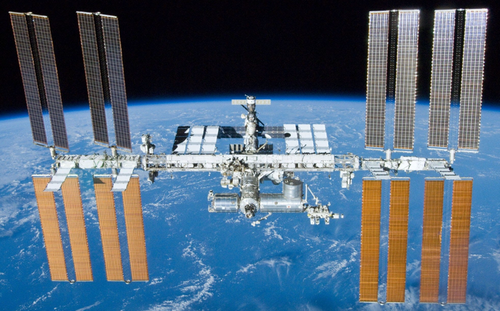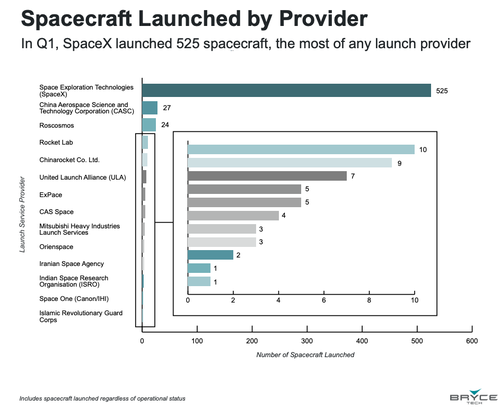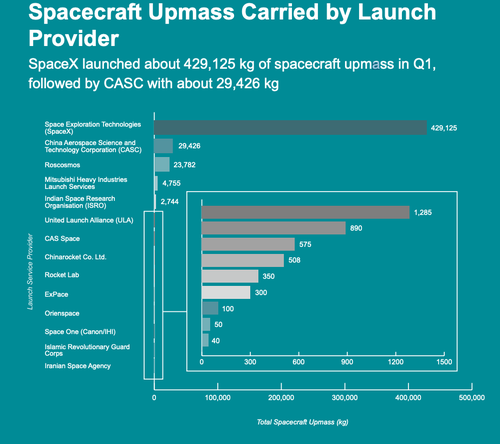
In a major vote of confidence for Elon Musk's SpaceX, NASA has awarded the private space company a contract worth nearly $1 billion. This contract is for developing a "Deorbit Vehicle," which will be responsible for steering the International Space Station out of orbit by the end of the decade.
"NASA announced SpaceX has been selected to develop and deliver the US Deorbit Vehicle that will provide the capability to deorbit the space station and ensure avoidance of risk to populated areas," the space agency wrote in a press release.
The ISS, launched in 1998, recently extended its operational life from 2024 to 2030. Russia plans to withdraw from the ISS in the coming years and focus on building its own space station. The Deorbit Vehicle will steer the ISS into the Pacific Ocean.
"Selecting a US Deorbit Vehicle for the International Space Station will help NASA and its international partners ensure a safe and responsible transition in low Earth orbit at the end of station operations. This decision also supports NASA's plans for future commercial destinations and allows for the continued use of space near Earth," Ken Bowersox, associate administrator for Space Operations Mission Directorate at NASA Headquarters in Washington, wrote in a press release.
On Wednesday Musk wrote on X, "The Moon Station that Starship will enable will be great."
But the Moon Station that Starship will enable will be great
— Elon Musk (@elonmusk) June 27, 2024
In January, Musk contemplated building stations on both the Moon and Mars.
We recently pointed out that, using data from BryceTech, SpaceX is leading the world's rocket race—great news for America's future rocket program.
SpaceX launched about 429,125 kg of spacecraft upmass in the first quarter, significantly outpacing China's rocket program (China Aerospace Science and Technology Corporation), which launched a measly 29,426 kg.
Musk is the rocket man.
Welcome to the future https://t.co/KQ0jPS0Pzo
— Elon Musk (@elonmusk) June 27, 2024
— Elon Musk (@elonmusk) June 26, 2024
Meanwhile, a new Bloomberg report says SpaceX is selling insider shares at $112 apiece in a tender offer, valuing the space and satellite company around $210 billion.
In a major vote of confidence for Elon Musk’s SpaceX, NASA has awarded the private space company a contract worth nearly $1 billion. This contract is for developing a “Deorbit Vehicle,” which will be responsible for steering the International Space Station out of orbit by the end of the decade.
“NASA announced SpaceX has been selected to develop and deliver the US Deorbit Vehicle that will provide the capability to deorbit the space station and ensure avoidance of risk to populated areas,” the space agency wrote in a press release.
The ISS, launched in 1998, recently extended its operational life from 2024 to 2030. Russia plans to withdraw from the ISS in the coming years and focus on building its own space station. The Deorbit Vehicle will steer the ISS into the Pacific Ocean.
“Selecting a US Deorbit Vehicle for the International Space Station will help NASA and its international partners ensure a safe and responsible transition in low Earth orbit at the end of station operations. This decision also supports NASA’s plans for future commercial destinations and allows for the continued use of space near Earth,” Ken Bowersox, associate administrator for Space Operations Mission Directorate at NASA Headquarters in Washington, wrote in a press release.
On Wednesday Musk wrote on X, “The Moon Station that Starship will enable will be great.”
But the Moon Station that Starship will enable will be great
— Elon Musk (@elonmusk) June 27, 2024
In January, Musk contemplated building stations on both the Moon and Mars.
We recently pointed out that, using data from BryceTech, SpaceX is leading the world’s rocket race—great news for America’s future rocket program.
SpaceX launched about 429,125 kg of spacecraft upmass in the first quarter, significantly outpacing China’s rocket program (China Aerospace Science and Technology Corporation), which launched a measly 29,426 kg.
Musk is the rocket man.
Welcome to the future https://t.co/KQ0jPS0Pzo
— Elon Musk (@elonmusk) June 27, 2024
— Elon Musk (@elonmusk) June 26, 2024
Meanwhile, a new Bloomberg report says SpaceX is selling insider shares at $112 apiece in a tender offer, valuing the space and satellite company around $210 billion.
Loading…








